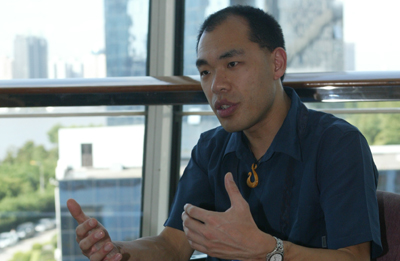|

|
|
Mr. Liu is the president of the New Zealand Society of Translators and Interpreters (NZSTI). |
By staff reporter He Shan
"This is the greatest FIT World Congress I have ever attended!"said Henry Liu with a smile, while seated in a lounge of the Shanghai International Convention Center during a tea break from the proceedings.
Mr. Liu, born in Hong Kong, migrated to New Zealand as a youth. As the president of the New Zealand Society of Translators and Interpreters (NZSTI), he is working hard to promote the association to the rest of the world.
A major milestone in his career was when he was elected a council member of the International Federation of Translators (FIT) at the current congress.
"NZSTI will play a greater role in elevating translation to a respected profession,"said the active thirty-something man, oozing an air of composure and self-confidence.
On his agenda, he will tighten ties with next-door neighbor Australia as well as China.
"We have close connection with Australia in the world of translation, for example in education and accreditation, to name just two things,"he said.
Emulating Australia, New Zealand has introduced the National Accreditation Authority for Translation and Interpreters (NATTI). "We have similar situation and close geography,"he explained.
"Although we haven't established a relationship with the Translators Association of China (TAC), exchanges and other activities will not be far away."
"Compared with translation, interpretation education is in dire need of resources. If there are more students, we can apply for more funding from the government,"he added.
NZSTI was established in 1985 as a representative body of practicing professional translators and interpreters in New Zealand. Maori, which enjoys good social status when compared with indigenous languages in Australia, and New Zealand sign language, are the country's two official languages.
At present, there is a rising appetite for Chinese translation in the market. According to Liu, the free trade agreement signed between China and New Zealand will provide a boon to the translation industry of the two countries.
Liu said the most important things for his organization are to improve translation quality and establish a rapport with the government and translation companies. At the Statutory Meeting of the congress, he proposed that FIT should establish an ad hoc team to investigate complaints pertaining to translation service.
Currently, the NZSTI makes itself financially viable through an annual fee. The core problem lies in drawing new members and retaining them.
"Primarily, the mission of NZSTI is to enhance the status of translators and enhance the awareness of the importance of translation,"he remarked.
In his opinion, standardization is the most significant factor in the maturing of the translation industry. "I suggest setting up a database of previous complaints and ruling, i.e.case laws for the standarization of complaints and disciplinary process accros the world. That means law is brought into the industry, to gauge the quality of translation service provided by translators."
Liu was excited by the grandeur of the congress and found it worth the trip. "For me, the most important thing was the communication between different associations. My line of work is community translation. Through the congress, I was able to make contact with other people in my field,"said Liu.
(China.org.cn August 7, 2008)